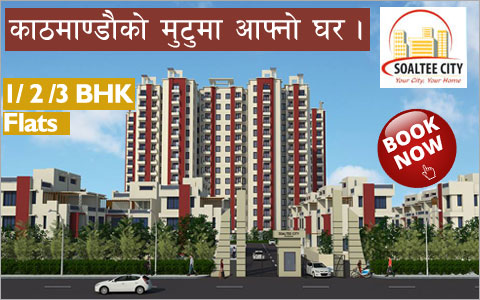National News

The Kathmandu Metropoli-tan City’s campaign to collect house and land taxes has not fared as expected. In over two months, the KMC collected Rs 30 million—only 3 percent of the targeted Rs 1 billion.
To intensify tax collection, the metropolis in January directed house and land owners to ensure that they clear their taxes within the second week of the month.
The tax was focused on commercial complexes having an area of 10,000 sq feet in all the 35 wards of Kathmandu. It also had plans to add 10 percent fine to the pending amount upon failure to clear dues by mid-January. While the KMC initially blacklisted 1,535 houses that defied property tax rules for years, the number was cut to 1,335 later as around 200 were regular taxpayers.
KMC officials said the taxpayers have defied its directive for prompt tax clearance and were requesting the metropolis for an extension to pay these taxes either by the end of this fiscal year or even pushing the deadline to the next fiscal.
The KMC decided to be flexible, considering the requests of these big institutions which include banks, malls, shopping complexes and cinema halls. “None of these institutions will collapse, as they are responsible entities. Hence, we decided to act less tough and consider their problems,” said Mahesh Kafle, chief of the Revenue Department at the KMC.
“As these institutions approached us with their limitations in response to the correspondence we made, we were confident that they would pay their pending taxes late, rather than never,” Kafle added. He claimed that about 90 big institutions responded to the directive by asking for an extension of the cut-off date for clearance, while the KMC has specified no other deadline for the payments. Earlier, the KMC dispatched letters to all other intuitions via its ward offices.
“We did not have this level of success in collection earlier,” said Kafle. Most of the taxes to be collected include the chronic dues between 2004 and 2010.
Anther major reason for unsuccessful tax collection is the metropolis’ failure to explain the kind of taxes these business entities require to pay. These include house and land, rent, business and entertainment taxes.
“Many of the taxpayers weren’t aware of the variety of taxes they were required to pay us as one entity. We have shortcomings on our part too,” said Kafle.
The defaulters include A-class banks, insurance companies, cooperatives, hotels and some government entities. Some 27 banks and top hotels in Kathmandu have refused to pay taxes for long. Entities like Nepal Telecom and Karmachari Sanchaya Kosh which own a number of properties in the Capital’s prime locations are found to have defaulted on their property tax for years.
Municipal authorities have threatened to withdraw basic services and facilities from these households such as garbage collection, drinking water supply, and telephone and electri city connectivity. A house owner is required to pay around Rs 22,000 per year for a structure built on 10,000 sq feet. Ward No 34 has the highest number of houses defaulting on taxes.
Although the tax collection campaign is yet to gain momentum, the KMC has made a significant revenue collection this fiscal year.
Its revenue has grown by 33 percent, collecting an additional Rs 247 million in the six months of the current fiscal compared to 2012-13.
source: the kathmandu post,24 feb 2014
- 9th Nepal Buildcon International Expo 2024
- Real Estate Expo 2023
- NRB raises housing loan limit to encourage home constructions
- Nepal Rastra Bank (NRB) Monetary Policy 2080-2081
- New Price of Land in Kathmandu Metropolitan City, Nepal
- Capital Gains Tax Rate on Real Estate Transactions in Nepal 2080-81 ( 2023/24 )
- Kathmandu metropolis implements free parking policy for commercial buildings and hospitals

![[X]](https://www.housingnepal.com/images/popup-close-button.png)







































































































































































































































































































































































































































 Facebook
Facebook
 Delicious
Delicious
 Digg
Digg
 Reddit
Reddit
 Stumble Upon
Stumble Upon









